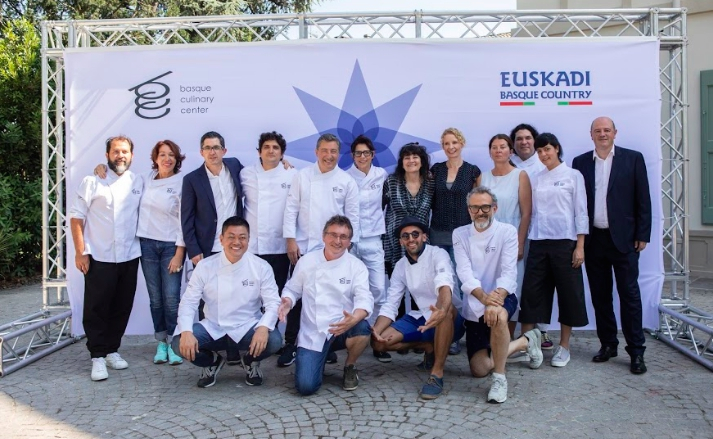One of the many reasons why we should be grateful to the Basque Culinary Center, to Massimo Bottura and Lara Gilmore, is that they invited to Modena prominent global figures, authorities who can direct and nourish the debate on how to “transform society through gastronomy”.
Ruth Reichl, who has just turned 70, is the most famous food critic in the United States. From New York, of Jewish-German descent, she’s worked for over half a century as cook, and food writer for Los Angeles Times, New York Times and Gourmet. She’s won 6 James Beard Awards, received many acknowledgements and written books sold in millions of copies (the latest, “My kitchen year: 136 recipes that saved my life”, 2015).
Her work has had a significant impact not just on restaurant aesthetics or on food tasting, but on issues that have long been neglected by fine dining, such as social responsibility, gender discrimination («Big restaurants’ kitchens», she told New Yorker, «are a sexist theatre»), climate issues. We were struck by her friendliness and prompt smile.
Can change really occur through gastronomy?
I am sure it can. This topic has never received so much attention. Think of Anthony Bourdain and Jonathan Gold: their death caused broken hearts all around the world, something unthinkable until a few years ago. It’s a sign of the change taking place. A sign that food has finally made an impression on people’s hearts. It’s a great opportunity for the people in this industry, in every part of the planet.

Standing in the middle, Reichl during the symposium organised by the Basque Culinary Center in Modena, on July 24th
Because it’s the most effective language that can make people understand what’s wrong in the world. It’s the most accessible glass through which one can read things. Massimo [Bottura] knows this perfectly well. His success is huge but he doesn’t want to serve food to the rich. He’s always asking himself: how can I return what I got?
Even in your country, there’s plenty of examples.
There are activists such as Tom Colicchio, who’s doing a big political job. Or Dan Barber, who’s very committed in social work. When I first started writing, chefs didn’t leave the kitchen. And we, as journalists, only wrote about their deliciousness; few were interested in agriculture or science, they never crossed the line. Now there are colleagues who write about restaurant business, about food chemistry, writers who assess the impact of climate on what we eat or drink, who research gender issues. It’s a huge opportunity and it shouldn’t be wasted.
As for gender issues, these are the years of #metoo.
It’s another big wave we should ride. If we don’t continue to press charges, to create noise around discriminations, we’re fools. There was a time when I worked as a freelance writer and cook: I was harassed more often as a client, than in the kitchen. I wouldn’t like my granddaughter to experience the same. Luckily these days it’s not like then. Thirty years ago women were even less respected: when people brought me a menu with no prices in it, I went mad.
Have restaurants changed their nature so much?
Greatly. When I first started to write, clients were almost all rich, white, old, formal. Today they are much younger. They travel, they know food from all around the world. They have a closer relationship with chefs, they want to be their friends. They don’t like to hear waiters saying ‘excellent choice’ because they believe they know more than waiters themselves.
In years when the Internet has weakened the authoritativeness of critics, to whom should we listen?
You’re right, there are so many voices. My father is from Berlin. He used to say that my grandfather would get the newspaper every day: he read right wing and left wing opinions, and finally made up his mind. The greatest danger I see today is that left people only read the left, and right only the right; we no longer read each other. Yet we must make an effort and understand a different point of view. We must acquire a certain dose of scepticism, and use our brains. Trump only reads friendly newspapers; not us. Then, if a newspaper says he’s done something good, we all know it’s not true.
Your president denies the impact of climate change.
It’s a total nonsense. This is happening and we all know it: if we believe climate change is a fake news, the world will disappear. I’m writing a book, out in September, in which I explain how our work is manipulated – and not just on our subject – and how it is as important as ever to grow a spine. What we can do, as communicators, is give voice to scientists, but using a language that common people can understand. This is the mission I chose.